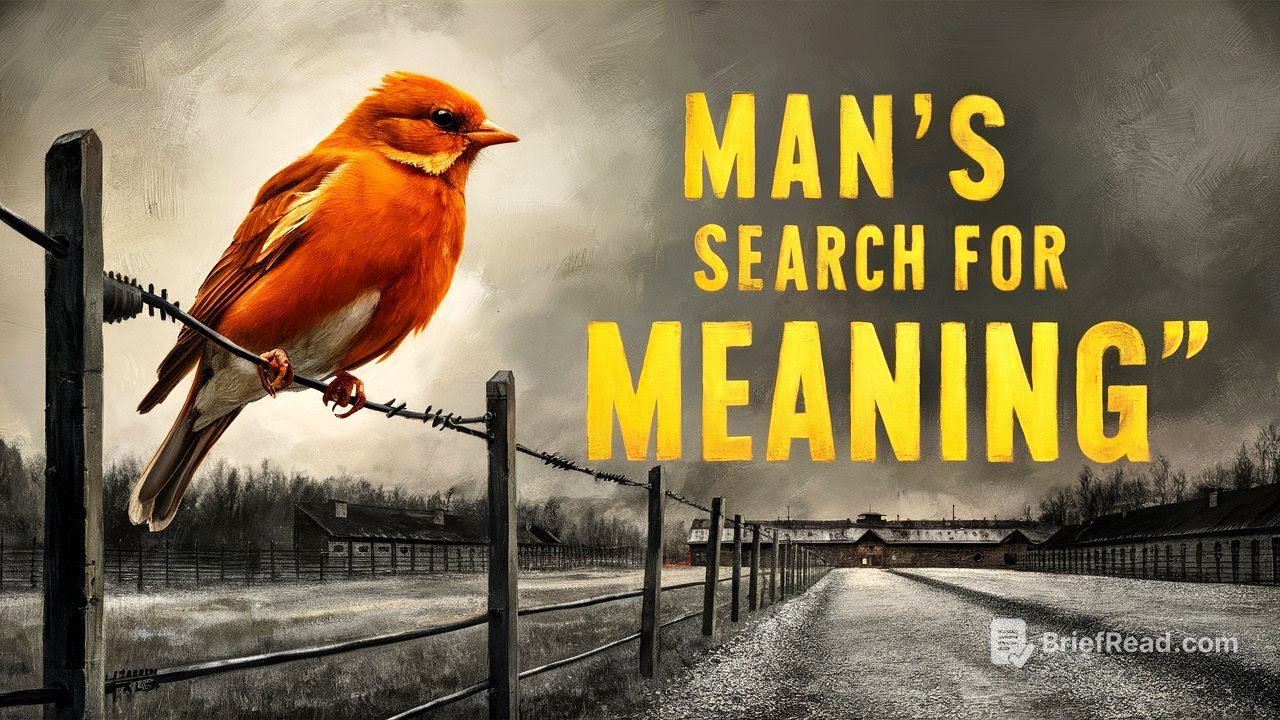TLDR;
This text is a comprehensive summary of Viktor Frankl's "Man's Search for Meaning," focusing on the core concepts of logotherapy, the experiences in concentration camps, and the search for meaning in life, even amidst suffering. It highlights the importance of finding purpose, the role of love, and the capacity for individuals to choose their attitude in any given set of circumstances.
- Logotherapy emphasizes finding meaning in life as the primary motivational force.
- The book explores experiences in concentration camps and the psychological phases prisoners go through.
- It introduces the concept of "tragic optimism," maintaining hope despite life's inherent tragedies.
Preface [0:48]
Dr. Frankl's logotherapy helps patients find meaning in their lives to combat suicidal thoughts, using love, talent, or memories as anchors. His experiences in concentration camps, where he lost his family, led him to develop this approach. Despite suffering from hunger, cold, and brutality, he sought to find life worth preserving. Frankl's theories differ from Freud's, focusing on the frustration of meaning rather than sexual frustration as the root of neurosis. Logotherapy builds on Freud's contributions and welcomes kinship with other existential therapies. The narrative is gripping, gently introducing logotherapy and revealing profound depth beyond a brutal tale of concentration camps. Readers learn how individuals behave when they realize they have nothing to lose, balancing emotions and apathy. Strategies for survival include preserving images of loved ones, religion, humor, and nature. The will to live arises from making sense of suffering, with each person finding their purpose and accepting responsibility. Frankl quotes Nietzsche: "He who has a why to live can bear with almost anyhow." In concentration camps, prisoners lose everything except the freedom to choose their attitude, proving man's capacity to rise above outward fate.
Author's Preface [7:47]
The book's success reflects the misery of our time, with many seeking meaning in life. Its impact comes from the existential validation of theories through autobiographical accounts. Written in nine days in 1945, Frankl initially intended for it to be published anonymously, aiming to demonstrate that life holds potential meaning under any conditions, even the most miserable ones. He felt responsible for sharing his experiences to help those prone to despair. Frankl advises students not to aim for success directly, but to dedicate themselves to a cause greater than themselves or surrender to another person. Success and happiness should ensue as unintended side effects. He encourages listening to one's conscience and carrying out its commands, promising that success will follow. A new chapter, "The Case for a Tragic Optimism," addresses present-day concerns and how to embrace life despite its tragic aspects, hoping to inspire optimism from past experiences in concentration camps.
Experiences in a Concentration Camp [12:13]
The book shares personal experiences, not just facts, focusing on the average prisoner's mindset in concentration camps, particularly in smaller extermination camps. It's about the sacrifices of unknown victims, not heroes or privileged prisoners (capos). Capos, chosen for brutality, often mistreated prisoners more than guards. Outsiders often misunderstand camp life, unaware of the daily struggle for survival. Transports to gas chambers led to fights among prisoners to remove their names from the list, knowing another victim would be chosen. Prisoners were reduced to numbers, tattooed and sewn onto clothing, dreaded by all. Moral issues were ignored as men fought to survive for their families and friends, arranging for others to take their place in transports. Only the most brutal prisoners became capos, with few exceptions. Survivors often owed their lives to luck, knowing the best among them did not return. The essay aims to explain these experiences in light of modern knowledge, helping those who haven't been inside to understand the survivors' difficulties.
Phase 1: Admission [21:59]
The initial phase of camp life is characterized by shock, sometimes preceding formal admission. An example is given of a transport of 1500 people traveling for days in crowded conditions, eventually arriving at Auschwitz, a name synonymous with horror. The sight of the camp, with barbed wire, watchtowers, and columns of ragged figures, was horrifying. Upon arrival, prisoners were met with shouted commands and stormed into the carriages by well-fed prisoners in striped uniforms, who spoke with a grotesque humor. This led to a "delusion of reprieve," clinging to hope despite the circumstances. The new arrivals were then cooped up in a shed, cold and hungry, where senior prisoners bargained over valuables. Some prisoners, employed in gas chambers and crematoriums, received liquor from the SS. The prisoners were told to leave their luggage and form two lines, where they filed past an SS officer who pointed to the right or left, a selection process determining life or death. Those sent to the left were marched straight to the crematorium, while the minority who were saved were taken to a cleansing station.
Cleansing and Initial Humiliation [29:17]
At the cleansing station, the SS men seemed charming, but only to persuade prisoners to hand over watches and jewelry. Prisoners were ordered to throw all their possessions into blankets, with naive individuals still hoping to keep wedding rings or good luck pieces. The narrator tried to confide in an old prisoner about his manuscript, but was met with mockery. Striking out his whole former life marked the culmination of the first phase of psychological reaction. The prisoners were driven into the anteroom of the bath, given two minutes to undress completely, and then herded into another room to be shaved entirely. In the showers, they realized they had nothing left except their bare bodies. There was extra excitement for those with trusses, as the senior prisoner threatened to hang anyone who had sewn money or precious stones into them. Shoes were exchanged for ill-fitting pairs, and those who had shortened their jackboots were severely punished. The illusions were destroyed one by one, and a grim sense of humor overcame most, as they knew they had nothing to lose except their ridiculously naked lives.
Curiosity and Surprise [36:29]
Apart from humor, curiosity seized the prisoners, detaching the mind from its surroundings as a means of protection. They were anxious to know what would happen next, such as the consequence of standing naked in the cold. In the next few days, curiosity evolved into surprise that they did not catch cold. Medical men learned that textbooks lied about the necessity of sleep. The first night in Auschwitz, nine men slept on each tier of bunks, sharing two blankets, yet sleep came and brought oblivion. Other surprises included healthier gums despite the lack of dental care and vitamin deficiency, and the SS and abrasions on dirty hands not suppurating. A light sleeper found himself sleeping soundly next to a snoring comrade. If asked about Dostoevsky's statement that man can get used to anything, they would reply yes, but not ask how. The prisoners were still in the first phase of their psychological reactions, and the thought of suicide was entertained by nearly everyone. The narrator made a firm promise not to run into the wire, the most popular method of suicide.
The Reality of Selection [40:54]
In the first phase of shock, prisoners did not fear death, and even the gas chambers lost their horror. A colleague who had arrived in Auschwitz weeks previously smuggled himself into their heart to give tips, but his kindly words were misleading. A doctor advised shaving daily to look younger and fitter for work, as those who looked miserable and emaciated ("Muslims") were sent to the gas chambers. He pointed out the narrator as the only one who must fear the next selection, but the narrator smiled. An abnormal reaction to an abnormal situation is normal behavior. The reactions of a man to his admission to a concentration camp also represent an abnormal state of mind, but judged objectively, it is a normal and typical reaction to the given circumstances. These reactions began to change in a few days, as the prisoner passed from the first to the second phase, the phase of relative apathy.
Phase 2: Relative Apathy [44:17]
Apart from the initial shock, the newly arrived prisoner experienced torturous emotions, including longing for home and disgust with the ugliness surrounding him. Most prisoners were given rags for uniforms, and the camp was filled with filth. New arrivals were often detailed to clean latrines, and any sign of disgust would be punished. At first, prisoners looked away from punishment parades, but later, their feelings were blunted, and they watched unmoved. They stood unmoved while a 12-year-old boy was carried in with frostbitten toes, which the doctor picked off with tweezers. Disgust, horror, and pity were emotions that the spectator could not really feel anymore. The sufferers, the dying, and the dead became commonplace sights. Apathy, the blunting of emotions, and the feeling that one could not care anymore were the symptoms arising during the second stage of the prisoner's psychological reactions, which eventually made him insensitive to daily beatings.
Insensibility and Injustice [49:32]
Through insensibility, the prisoner surrounded himself with a necessary protective shell. Beatings occurred on the slightest provocation, and it was not the physical pain that hurt the most, but the mental agony caused by the injustice. A blow that did not even find its mark could hurt more than one that did. Once, the narrator paused to lean on his shovel during work, and a guard threw a stone at him, which seemed like attracting the attention of a beast. The most painful part of beatings was the insult they implied. Another time, the narrator jumped to help a friend carrying a girder and was hit on the back and reprimanded. In a forest, a foreman with rosy cheeks threatened to kill the narrator, who straightened up and looked him in the eye, stating he was a doctor. The foreman threw himself on him and knocked him down. Indignation could rouse even a seemingly hardened prisoner, not about cruelty or pain, but about the insult connected with it.
The Carpo and the Soup [54:34]
The carpo in the narrator's working party was obligated to him because he listened to his love stories and matrimonial troubles. The narrator had made an impression on him with his diagnosis of his character and psychotherapeutic advice. The carpo reserved a place for him in one of the first five rows of their Detachment, which consisted of 280 men. This favor was important, as everyone was afraid of being late and having to stand in the back rows. The senior carpo often collected men for unpleasant jobs from the back rows. As an additional payment for his services, the carpo would dip the ladle right to the bottom of the vat and fish out a few peas when it was the narrator's turn to receive soup. The carpo even had the courage to whisper to the foran whom the narrator had quarreled with that he knew him to be an unusually good worker.
Apathy and Regression [58:45]
Apathy, the main symptom of the second phase, was a necessary mechanism of self-defense. Reality dimmed, and efforts and all emotions were centered on preserving one's own life and that of the other fellow. It was typical to hear prisoners sigh with relief and say, "Well, another day is over." Such strain and the constant necessity of concentrating on staying alive forced the prisoners' inner life down to a primitive level. Colleagues trained in psychoanalysis spoke of a regression in the camp inmate, a retreat to a more primitive form of mental life. The prisoners dreamed most frequently of bread, cake, cigarettes, and nice warm baths. The lack of having these simple desires satisfied led them to seek wish fulfillment in dreams.
Dreams and Food [59:51]
The dreamer had to wake from dreams to the reality of camp life and the terrible contrast between that and his dream illusions. One night, the narrator was roused by the groans of a fellow prisoner having a horrible nightmare. He drew back the hand which was ready to shake him, conscious that no dream could be as bad as the reality of the camp. Because of the high degree of undernourishment, the desire for food was the major primitive instinct around which mental life centered. Prisoners would discuss food, exchange recipes, and plan menus for the day when they would be liberated and returned home. The discussions about food were regarded as dangerous, as they provoked the organism with detailed pictures of delicacies when it had adapted to extremely small rations.
Daily Rations and Physical Decline [1:01:49]
The daily ration consisted of watery soup and a small bread ration, with an extra allowance of margarine, sausage, cheese, honey, or gerem. This diet was inadequate, especially considering the heavy manual work and constant exposure to the cold. The sick were even worse off. When the last layers of subcutaneous fat had vanished, the prisoners looked like skeletons disguised with skin and rags. The organism digested its own protein, and the muscles disappeared. The body had no powers of resistance left, and the members of the little community in their heart died one after another. They could calculate whose turn would be next, knowing the symptoms well.
Thoughts About Food and the Loss of Sentiment [1:03:44]
Thoughts about food and favorite dishes forced themselves into the consciousness of the prisoner whenever he had a moment to spare. Even the strongest longed for the time when he would have fairly good food again, not for the sake of good food itself, but for the sake of knowing that the subhuman existence would cease. Those who have not gone through a similar experience can hardly conceive of the soul-destroying mental conflict and clashes of willpower which a famished man experiences. They can hardly grasp what it means to stand digging in a trench, listening only for the siren to announce the half-hour lunch interval when bread would be rationed out. There were endless debates on the sense or nonsense of certain methods of dealing with the small bread ration.
The Bread Ration and Cultural Hibernation [1:06:18]
There were two schools of thought regarding the bread ration: eating it immediately or dividing it up. The most ghastly moment of the 24 hours of camp life was the awakening, when the three shrill blows of a whistle tore them pitilessly from their exhausted sleep. In those ghastly minutes, one found a little bit of comfort in a small piece of bread. Undernourishment, besides being the cause of the general preoccupation with food, probably also explains the fact that the sexual urge was generally absent. With the majority of the prisoners, the primitive life and the effort of having to concentrate on just saving one's skin led to a total disregard of anything not serving that purpose and explained the prisoner's complete lack of sentiment. This was brought home to the narrator on his transfer from Auschwitz to a camp affiliated with Dachau, when he was denied a moment to look at his native town.
Politics, Religion, and Typhus [1:08:59]
In general, there was also a cultural hibernation in the camp, with two exceptions: politics and religion. Politics were talked about everywhere, based chiefly on rumors about the military situation. The religious interest of the prisoners was the most sincere imaginable, with improvised prayers or services in the corner of a heart or in the darkness of a locked cattle truck. In the winter and spring of 1945, there was an outbreak of typhus, which infected nearly all the prisoners. The mortality was great among the weak, and the quarters for the sick were inadequate. To avoid attacks of delirium, the narrator tried to keep awake for most of the night, reconstructing the manuscript which he had lost in the disinfection chamber of Auschwitz.
Art, Love, and the Inner Life [1:13:19]
In spite of all the enforced physical and mental primitiveness of the life in a concentration camp, it was possible for spiritual life to deepen. Sensitive people who were used to a rich intellectual life may have suffered much pain, but the damage to their inner selves was less. They were able to retreat from their terrible surroundings to a life of inner riches and spiritual freedom. Only in this way can one explain the apparent paradox that some prisoners of a less hardy makeup often seem to survive camp life better than did those of a robust nature. On those early mornings when they had to march to their work site, the narrator's mind clung to his wife's image, and he heard her answering him, saw her smile, her frank and encouraging look. For the first time in his life, he saw the truth that love is the ultimate and the highest goal to which man can aspire.
The Strength of Love and the Beauty of Nature [1:17:27]
Love goes very far beyond the physical person of the Beloved; it finds its deepest meaning in his spiritual being, his inner self. Whether or not he is actually present, whether or not he is still alive at all, ceases somehow to be of importance. The intensification of inner life helped the prisoner find a refuge from the emptiness, desolation, and spiritual poverty of his existence by letting him escape into the past. When given free reign, his imagination played with past events, and his nostalgic memory glorified them. As the inner life of the prisoner tended to become more intense, he also experienced the beauty of art and nature as never before. If someone had seen their faces as they beheld the mountains of Salzburg with their summits glowing in the sunset, he would never have believed that those were the faces of men who had given up all hope of life and Liberty.
Art in the Camps and the Relativity of Suffering [1:22:18]
A kind of Cabaret was improvised from time to time, with songs, poems, and jokes meant to help them forget. The gatherings were so effective that a few ordinary prisoners went to see the Cabaret in spite of their fatigue, even though they missed their daily portion of food. Rewards were given in camp not only for entertainment but also for applause. Generally speaking, any pursuit of Art in camp was somewhat grotesque, and the real impression made by anything connected with art arose only from the ghostlike contrast between the performance and the background of desolate camp life. Humor was another of the Soul's weapons in the fight for self-preservation, affording an aloofness and an ability to rise above any situation, even if only for a few seconds. A man's suffering is similar to the behavior of gas: it completely fills the human soul and conscious mind, no matter whether the suffering is great or little. Therefore, the size of human suffering is absolutely relative.
The Smallest of Mercies and the Loss of Self-Respect [1:30:15]
A very trifling thing can cause the greatest of Joys. The prisoners envied convicts their relatively well-regulated, secure, and happy life, with regular opportunities to take baths, toothbrushes, clothes brushes, mattresses, and monthly mail. The scale of relative luck extended even further, and one could Envy a man who did not have to Wade in deep muddy Clay on a steep slope emptying the tubs of a small field Railway for 12 hours daily. No one can imagine the relief that the siren can bring in such a situation. The meager pleasures of camp life provided a kind of negative happiness, freedom from suffering, and even that in a relative way only. Everything that was not connected with the immediate task of keeping oneself and one's closest friends alive lost its value. A man's character became involved to the point that he was caught in a mental turmoil which threatened all the values he held and threw them into doubt.
The Loss of Individuality and the Desire for Solitude [1:38:24]
Under the influence of a world which no longer recognized the value of human life and human dignity, the personal ego suffered a loss of values. If the man in the concentration camp did not struggle against this in a last effort to save his self-respect, he lost the feeling of being an individual, a being with a mind, with inner freedom and personal value. He thought of himself then as only a part of an enormous mass of people, and his existence descended to the level of animal life. The men were herded like a flock of sheep, and each tried to get into the middle of their formations to avoid the blows of the guards. It was in an attempt to save one's own skin that one literally tried to submerge into the crow. The prisoner craved to be alone with himself and his thoughts, yearning for privacy and for Solitude.
The Value of Human Life and the Fear of Decisions [1:43:05]
It is very difficult for an outsider to grasp how very little value was placed on human life in camp. The camp inmate was hardened but possibly became more conscious of this complete disregard of human existence when a convoy of sick men was arranged. The emaciated bodies of the sick were thrown on two-wheeled carts which were drawn by prisoners for many miles. If one of the sick men had died before the cart left, he was thrown on anyway. A man counted only because he had a prison number. The prisoners saw themselves completely dependent on the moods of the guards, playthings of fate, and this made them even less human than the circumstances warranted. The camp inmate was frightened of making decisions and of taking any sort of initiative, as fate was one's master.
The Decision to Escape and the Arrival of the Red Cross [1:51:39]
The prisoner would have preferred to let fate make the choice for him, especially when deciding for or against an escape attempt. The narrator had the opportunity to escape, but at the last moment, there were technical difficulties, and they had to return to camp. He broke into an empty heart of the women's Camp to look for a rock sack and suddenly saw the body of a woman. He made a quick last round of his patients, and his comrade seemed to Guess that something was wrong. The unpleasant feeling that had gripped him as soon as he had told his friend he would escape with him became more intense. Suddenly, he decided to take fate into his own hands and told his friend that he could not go with him. As soon as he had told him with finality that he had made up his mind to stay with his patience, the unhappy feeling left him.
Liberation and the Aftermath [1:55:18]
The Battlefront came nearer, and an order was given that the camp must be evacuated completely by Sunset. The narrator and his friend decided to escape, but the camp gate was thrown open, and a delegate from the International Red Cross in Geneva had arrived. The camp and its inmates were under his protection. There was no need for them to risk running toward the fighting line. The guard who accompanied them suddenly became quite gentle and joined in the short prayers that they offered for the dead men. The last day in camp passed in anticipation of freedom, but they had rejoiced too early. The SS arrived with trucks and brought an order to clear the camp. The chief doctor omitted the narrator and his friend from the list, and they had to stay behind. The Battle Front had reached them, and a white flag floated in the wind.
The Uncertainties of Fate and the Two Races of Men [2:00:57]
They found out that their friends who had thought they were traveling to Freedom that night had been taken in the trucks to another camp and there they were locked in the huts and burned to death. The narrator thought again of death in Taron. The prisoner's apathy was also the result of other factors: hunger, lack of sleep, and the in of vermin. The majority of prisoners suffered from a kind of inferiority complex, feeling utterly degraded. The more prominent prisoners did not feel degraded at all but on the contrary, promoted. The general irritability became most intense when these mental tensions were added. There are two races of men in this world: the race of the decent man and the race of the indecent man. Both are found everywhere, and the boundaries between groups overlapped.
The Psychology of the Liberated Prisoner [2:02:11]
The experiences of Liberation were personal, and the prisoners dragged themselves to the camp Gates, looking around timidly. This time, the guards offered them cigarettes. They walked slowly along the road, wanting to see the Camp surroundings for the first time with the eyes of free men. They could not grasp the fact that freedom was theirs. In the evening, they said to each other, "Tell me, were you pleased today?" and the other replied, "Truthfully, no." They had literally lost the ability to feel pleased and had to relearn it slowly. Psychologically, what was happening to the liberated prisoners could be called depersonalization. Everything appeared unreal, unlikely, as in a dream. The body made good use of the New Freedom from the first moment on, eating ravenously for hours and days.
Re-Personalization and the Dangers of Freedom [2:06:15]
Many days passed until something within oneself was loosened, and feeling suddenly broke through the strange fets which had restrained it. One day, the narrator walked through the country past flowering Meadows, and he went down on his knees. At that moment, there was very little he knew of himself or of the worlds. His new life started step for step, and he progressed until he again became a human being. The way that led from the acute mental tension of the last days in Camp from the war of nerves to mental peace was certainly not free from obstacles. It would be an error to think that a liberated prisoner was not in need of spiritual care anymore. People with Natures of a more primitive kind could not escape the influences of the brutality which had surrounded them in Camp life.
Bitterness and Disillusionment [2:09:58]
Apart from the moral deformity resulting from the sudden release of mental pressure, there were two other fundamental experiences which threatened to damage the character of the liberated prisoner: bitterness and disillusionment. Bitterness was caused by a number of things he came up against in his former Hometown. The experience of disillusionment was different, and it was fate itself which seemed so cruel. A man who for years had thought he had reached the absolute limit of all possible suffering now found that suffering has no limits. After Liberation, there were some men who found that no one awaited them.
The Meaning of Life and the End of the Nightmare [2:12:54]
There could be no earthly happiness which could compensate for all they had suffered, and yet they were not prepared for unhappiness. This disillusionment was an experience which these men have found very hard to get over. For every one of the liberated Prisoners, the day comes when, looking back on his Camp experiences, he can no longer understand how he endured it all. As the day of his Liberation eventually came when everything seemed to him like a beautiful dream, so also the day comes when all his Camp experiences seem to him nothing but a nightmare. The crowning experience of all for the homecoming man is the wonderful feeling that after all he has suffered, there is nothing he need fear anymore except his God.
Logotherapy in a Nutshell: Introduction [2:14:41]
Logotherapy, often called the Third Viennese School of Psychotherapy, focuses on the meaning of human existence and the search for that meaning. It posits that striving to find meaning is the primary motivational force in man, termed the "will to meaning," contrasting with Freud's "will to pleasure" and Adler's "will to power." This meaning is unique and specific, fulfilled by the individual alone. Some argue meanings and values are defense mechanisms, but Frankl asserts people live and die for ideals and values. Public opinion polls confirm that most people believe in the necessity of something to live and die for.
Existential Frustration and Noogenic Neurosis [2:16:36]
The "will to meaning" can be frustrated, leading to "existential frustration," which can result in "noogenic neurosis," originating in the neurological dimension of human existence. Noogenic neuroses stem from existential problems rather than conflicts between drives and instincts. Logotherapy, therefore, is the appropriate therapy, addressing the specifically human dimension. An American diplomat's case illustrates this, where dissatisfaction with his career was misinterpreted as hatred toward his father. Addressing his frustrated "will to meaning" by changing careers led to contentment. Not every conflict is neurotic; some are normal and healthy. Suffering, too, can be a human achievement, especially if it arises from existential frustration.
The Meaning of Life and Responsibility [2:29:09]
Logotherapy assists patients in finding meaning in their lives, making them aware of the hidden logos of their existence. It deviates from psychoanalysis by considering man as a being whose main concern is fulfilling a meaning rather than merely gratifying drives or adapting to society. Man's search for meaning can create inner tension, which is essential for mental health. Nietzsche's words, "He who has a why to live for can bear almost anyhow," serve as a guiding motto. The most depressing influence in a concentration camp was the uncertainty of the term of imprisonment.
The Loss of the Future and the Importance of a Goal [2:16:09]
A man who could not see the end of his provisional existence was not able to aim at an ultimate goal in life. He ceased living for the future, and the whole structure of his inner life changed. Prisoners suffered from a strange time experience, where a day filled with hourly tortures appeared endless, while a week seemed to pass very quickly. A man who let himself decline because he could not see any future goal found himself occupied with retrospective thoughts. In robbing the present of its reality, it became easy to overlook the opportunities to make something positive of camp life.
The Importance of Inner Strength and the Meaning of Suffering [2:07:21]
Any attempt at fighting the camp's psychopathological influence on the prisoner had to aim at giving him Inner Strength by pointing out to him a future goal to which he could look forward. The prisoner who had lost faith in the future was doomed. With his loss of belief in the future, he also lost his spiritual hold. He let himself Decline and became subject to mental and physical Decay. The ultimate cause of a friend's death was that the expected Liberation did not come, and he was severely disappointed. This suddenly lowered his body's resistance against the latent typhus infection.
The Meaning of Life and the Role of the Psychiatrist [2:29:09]
The attempt to restore a man's inner strength in the camp had first to succeed in showing him some future goal. It did not really matter what we expected from life, but rather what life expected from us. We needed to stop asking about the meaning of life and instead to think of ourselves as those who were being questioned by life. Life ultimately means taking the responsibility to find the right answer to its problems and to fulfill the tasks which it constantly sets for each individual. These tasks and therefore the meaning of life differ from man to man and from moment to moment.
The Uniqueness of Suffering and the Power of Love [2:30:32]
When a man finds that it is his Destiny to suffer, he will have to accept his suffering as his task, his single and unique task. He will have to acknowledge the fact that even in suffering, he is unique and alone in the universe. No one can relieve him of his suffering or suffer in his place. His unique opportunity lies in the way in which he Bears his burden. The meaning of life embraced the wider cycles of life and death, of suffering and of dying. Once the meaning of suffering had been revealed, they refused to minimize or alleviate the Camp's tortures by ignoring them or harboring false Illusions.
Psychotherapy and the Importance of Hope [2:32:49]
Any attempt at fighting the Camp's psychopathological influence on the prisoner by psychotherapeutic or psych hygienic methods had to aim at giving him Inner Strength by pointing out to him a future goal. Individual psychotherapeutic attempts were often a kind of life-saving procedure, concerned with the prevention of suicides. In both cases, it was a question of getting them to realize that life was still expecting something from them. This uniqueness and singleness which distinguishes each individual and gives a meaning to his existence has a bearing on Creative work as much as it does on human love.
The Power of Example and the Meaning of Sacrifice [2:34:47]
The opportunities for Collective Psychotherapy were naturally Limited in Camp, and the right example was more effective than words could ever be. A senior block Warden who did not side with the authorities had by his just and encouraging Behavior a thousand opportunities to exert a far-reaching moral influence on those under his jurisdiction. The immediate influence of behavior is always more effective than that of words. The purpose of the narrator's words was to find a full meaning in their life then and there, and he saw that his efforts had been successful.
The Psychological Makeup of the Camp Guards [2:42:11]
Among the guards, there were some sadists in the purest clinical sense, and these sadists were always selected when a really severe Detachment of guards was needed. The feelings of the majority of the Gods had been dulled by the number of years in which they had witnessed the brutal methods of the camp. Even among the guards, there were some who took pity on them. The mere knowledge that a man was either a camp guard or a prisoner tells us almost nothing. Human kindness can be found in all groups, and the boundaries between groups overlapped.
The Decent Man and the Indecent Man [2:44:50]
There are two races of men in this world, but only these two: the race of the decent man and the race of the indecent man. Both are found everywhere, and no group consists entirely of decent









